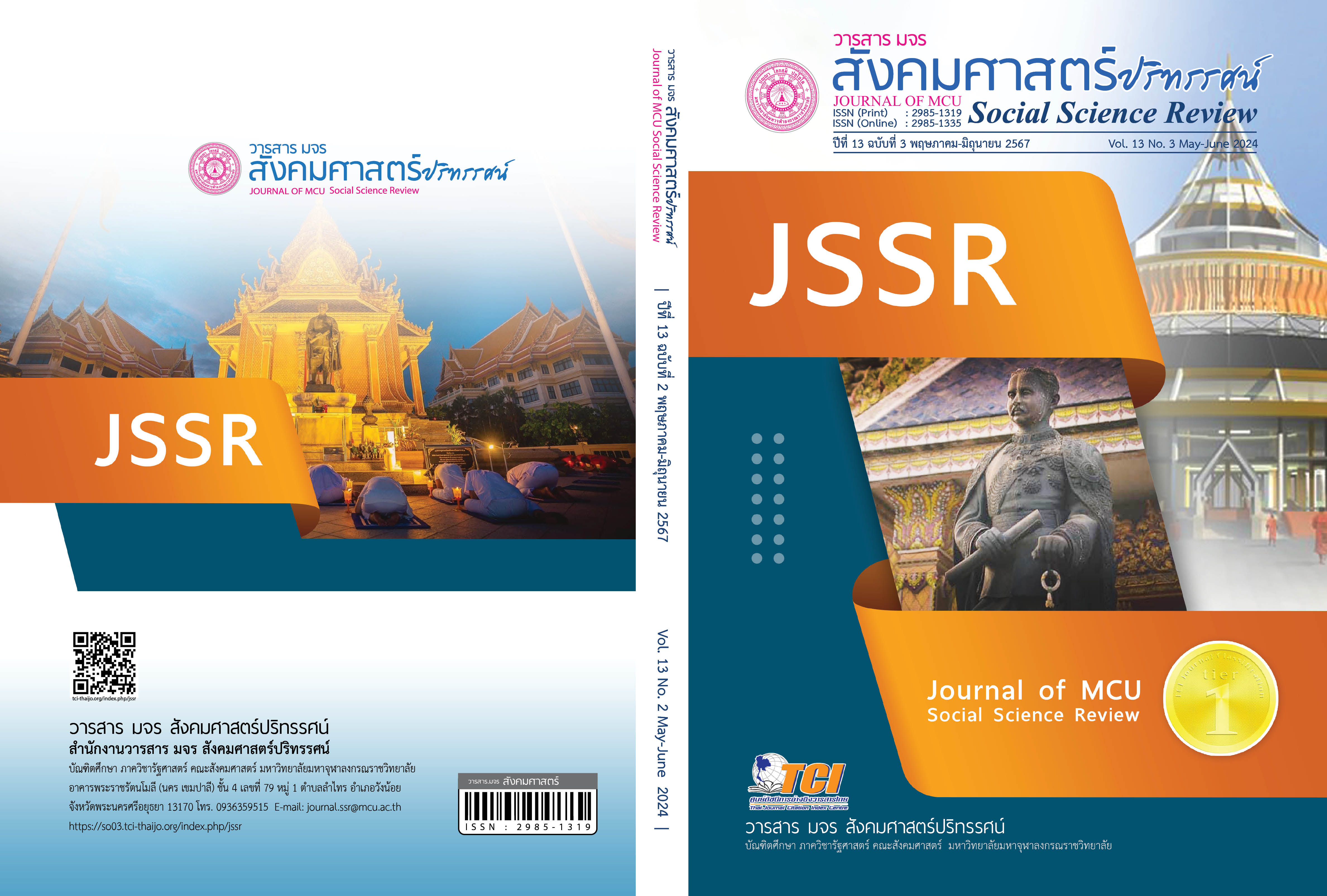การศึกษาความต้องการจำเป็นและวิธีการพัฒนาจิตวิญญาณองค์กร ของครูโรงเรียนโยธินบูรณะ
คำสำคัญ:
ความต้องการจำเป็น, วิธีการพัฒนาจิตวิญญาณองค์กรบทคัดย่อ
บทความวิจัยนี้มีวัตถุประสงค์ 1. ศึกษาสภาพปัจจุบัน สภาพที่พึงประสงค์ และความต้องการจำเป็นในการพัฒนาจิตวิญญาณองค์กรของครูโรงเรียนโยธินบูรณะ 2. ศึกษาวิธีการพัฒนาจิตวิญญาณองค์กรของครูโรงเรียนโยธินบูรณะ โดยใช้กรอบแนวคิดจิตวิญญาณองค์กร และวิธีการพัฒนาครู การวิจัยครั้งนี้ใช้วิธีการวิจัยเชิงบรรยาย ประชากรที่ใช้ในการวิจัย คือ โรงเรียนโยธินบูรณะ ผู้ให้ข้อมูล คือ ผู้อำนวยการสถานศึกษา รองผู้อำนวยการสถานศึกษา ผู้ช่วยรองผู้อำนวยการ หัวหน้ากลุ่มสาระการเรียนรู้ และครูผู้สอน จำนวน 115 คน เครื่องมือที่ใช้ในการวิจัย แบบสอบถามสภาพปัจจุบัน สภาพที่พึงประสงค์ ความต้องการจำเป็นและวิธีการพัฒนาจิตวิญญาณองค์กรของครูโรงเรียนโยธินบูรณะ ที่มีค่าความเชื่อมั่นเท่ากับ 0.956 สถิติที่ใช้ในการวิเคราะห์ข้อมูล คือ ความถี่ ร้อยละ ค่าเฉลี่ย ส่วนเบี่ยงเบนมาตรฐาน และการวิเคราะห์ความต้องการจำเป็น (PNImodified)
ผลการวิจัยพบว่า 1. สภาพปัจจุบันและสภาพที่พึงประสงค์ของการพัฒนาจิตวิญญาณองค์กรของครูโรงเรียนโยธินบูรณะ ในภาพรวมอยู่ในระดับปานกลาง (M=3.339, SD=0.793) และมากที่สุด (M=4.87, SD=0.354) ตามลำดับ โดยความต้องการจำเป็นในภาพรวม คือ 0.315 (PNImodified=0.315) เมื่อวิเคราะห์ความต้องการจำเป็นรายด้าน 3 ลำดับแรก พบว่า ด้านงานที่ให้ความสุขที่เหนือวัตถุนิยม มีความต้องการจำเป็นมากที่สุด (PNImodified=0.459) รองลงมา คือ ด้านการเชื่อมโยงกับผู้อื่น (PNImodified=0.326) และด้านเพื่องานที่มีค่ามีความหมาย มีค่าความต้องการจำเป็นน้อยที่สุด (PNImodified=0.319) ตามลำดับ 2. วิธีการพัฒนาจิตวิญญาณองค์กรของครูโรงเรียนโยธินบูรณะ ประกอบด้วย 1. ด้านงานที่ให้ความสุขที่เหนือวัตถุนิยม ได้แก่ การมอบหมายงาน 2. ด้านการเชื่อมโยงกับผู้อื่น ได้แก่ การสร้างชุมชนแห่งการเรียนรู้ทางวิชาชีพ 3. ด้านเพื่องานที่มีค่ามีความหมาย ได้แก่ การมอบหมายงาน ตามลำดับ
เอกสารอ้างอิง
กนิน แลวงค์นิล. (2560). แนวทางการพัฒนาสมรรถนะของครูใหม่สังกัดสำนักงานเขตพื้นที่การศึกษามัธยมศึกษา เขต 2 ตามแนวคิดการพัฒนาครูโดยโรงเรียนเป็นฐาน (วิทยานิพนธ์ครุศาสตรมหาบัณฑิต สาขาวิชาบริหารการศึกษา). กรุงเทพฯ: จุฬาลงกรณ์ มหาวิทยาลัย.
กลุ่มบริหารงานบุคคล การเงินและสินทรัพย์โรงเรียนโยธินบูรณะ. (2564). รายงานการดำเนินงานและการศึกษาสภาพปัญหาและความต้อง การในการพัฒนาครู (รายงานการวิจัย). กรุงเทพฯ: โรงเรียนโยธินบูรณะ.
กัณฑ์ฐพิชญา ศิริพุ่มซ่อน. (2555). ความสัมพันธ์ระหว่างการเสริมสร้างพลังอํานาจในงานและมี คุณค่าในตนเองต่อความสามารถในการปฏิบัติงานตามมาตรฐานการปฏิบัติการพยาบาลของวิชาชีพโรงพยาบาลหัวหิน (วิทยานิพนธ์วิทยาศาสตรมหาบัณฑิต สาขาวิชาจิตวิทยา การให้คําปรึกษา). กรุงเทพฯ: มหาวิทยาลัยรามคําแหง.
เกรียงศักดิ์ เจริญวงศ์ศักดิ์. (2563). เทคนิคการมอบหมายงานอย่างมีประสิทธิภาพ. สืบค้น 13 มกราคม 2565, จาก http://www.kriengsak.com
ชนกาญจน์ พันธุ์เดิมวงศ์. (2559). จิตวิญญาณในการทำงาน: มิติใหม่ในการบริหารทรัพยากรมนุษย์ (ดุษฎีนิพนธ์รัฐประศาสนศาสตรดุษฎีบัณฑิต สาขาวิชานโยบายสาธารณะและการจัดการภาครัฐ). นครปฐม: มหาวิทยาลัยมหิดล.
ชาญณรงค์ ชาญรุ่งโรจน์. (2558). คุณภาพศิษย์เป้าหมายการประเมิน. กรุงเทพฯ: ชิโน พับลิชชิ่ง แอนด์ แพคเกจจิ้ง.
นงลักษณ์ ภิญโญมงคล. (2550). ศิลปะของการมอบหมายงาน. วารสาร โปรดักทิวิตี้เวิลด, 12(71), 76-80.
นิสิต มโนตั้งวรพันธ์. (2554). การมอบหมายงานสำหรับผู้บริหาร. วารสารนักบริหาร, 31(3), 61-71.
ปภาวี กระบวนรัตน์. (2557). จิตวิญญาณในการทำงานในบริบทของวัฒนธรรมองค์การและการ รับรู้ความยุติธรรมในองค์การกรณีศึกษาการไฟฟ้านครหลวงฝ่ายจัดหา (วิทยานิพนธ์บริหารธุรกิจมหาบัณฑิต สาขาวิชาบริหารธุรกิจ). ปทุมธานี: มหาวิทยาลัยธรรมศาสตร์.
ภาวิณี เพชรสว่าง. (2563). สติ และจิตวิญญาณองค์กร. Journal of intelligence, 15(1), 118-144.
มณฑล สรไกรภูติ และสุนันทา เสียงไทย. (2556). มิติทางจิตวิญญาณในการทำงาน (Workplace Spirituality): ความท้าทายในการบริหารทรัพยากรมนุษย์. วารสาร มฉก.วิชาการ, 16(32), 113-124.
รัตติกรณ์ จงวิศาล. (2551). มนุษยสัมพันธ์ : พฤติกรรมมนุษย์ในองค์การ (พิมพ์ครั้งที่ 2). กรุงเทพฯ: มหาวิทยาลัยเกษตรศาสตร์.
วิภาพรรณ พินลา และวิภาดา พินลา. (2561). การจัดการเรียนรู้สังคมศึกษาเพื่อพัฒนาผู้เรียนด้านความรับผิดชอบต่อสังคม. Veridian E-Journal, Silpakorn University ฉบัภาษาไทย สาขามนุษยศาสตร์ สังคมศาสตร์ และศิลปะ, 11(1), 2185-2205.
ศิริชัย กาญจนวาสี. (2556). ทฤษฎีการทดสอบแบบดั้งเดิม (พิมพ์ครั้งที่ 7). กรุงเทพฯ: จุฬาลงกรณ์มหาวิทยาลัย.
สมชาติ กิจยรรยง. (2557). กลยุทธการบริหารจากการอ่านคน. กรุงเทพฯ: เพชรประกาย.
สำนักงานเขตพื้นที่การศึกษามัธยมศึกษากรุงเทพมหานคร เขต 1. (2565). รายงานผลการดำเนินงานประจำปี 2564. กรุงเทพฯ: สำนักงานเขตพื้นที่การศึกษามัธยมศึกษากรุงเทพมหานคร เขต 1.
สิทธิพร ปรีรอด. (2559). ความสัมพันธ์ระหว่างจิตวิญญาณในการทำงานความผูกพันต่อองค์การและพฤติกรรมการเป็นสมาชิกที่ดีขององค์การ : กรณีศึกษาสำนักงานปลัดกระทรวงทรัพยากรธรรมชาติและสิ่งแวดล้อม (การค้นคว้าอิสระบริหารธุรกิจมหาบัณฑิต สาขาวิชาบริหารธุกิจ). ปทุมธานี: มหาวิทยาลัยเทคโนโลยีราชมงคลธัญบุรี.
สิริพันธุ์ สุวรรณมรรคา. (2564). ชุมชนแห่งการเรียนรู้ทางวิชาชีพเพื่อการพัฒนาการศึกษา. สืบค้น 9 ธันวาคม 2565, จาก https://www.stou.ac.th/Schools/Sed
Afsar, B. & Badir, Y. (2017). Workplace Spirituality, Perceived Organizational Support and Innovative Work Behavior: The Mediating Effects of Person-Organization Fit. Journal of Workplace Learning, 29(2), 95-109.
Ashmos, D. P. & Duchon, D. (2000). Spirituality at work: A conceptualization and measure. Journal of Management Inquiry, 9(2), 134–145.
Kinjerski, V. & Skrypnek, B. J. (2006). A Human Ecological Model of Spirit at Work. Journal of Management, Spirituality & Religion, 3(3), 231-241.
Lizano, E. & MorBarak, M. (2012). Workplace demands and resources as antecedents of job burnout among public child welfare workers: A longitudinal study. Children and Youth Services Review, 34(9), 1769–1776.
Marques, J. et al. (2007). Spirituality in the Workplace: What It Is and Why It Matters. Library Journal, 132(4), 62-72.
Maslow, A. H. (1954). Motivation and Personality. New York, NY: Harper & Row Publishers.
Ray, T. K. et al. (2017). Employment arrangement, job stress, and health-related quality of life. Safety Science, 100(Part A), 46–56.
Robbins, S. P. & Judge, T. A. (2013). Organizational behavior. Boston: Pearson.
ดาวน์โหลด
เผยแพร่แล้ว
รูปแบบการอ้างอิง
ฉบับ
ประเภทบทความ
สัญญาอนุญาต
ลิขสิทธิ์ (c) 2024 วารสาร มจร สังคมศาสตร์ปริทรรศน์

อนุญาตภายใต้เงื่อนไข Creative Commons Attribution-NonCommercial-NoDerivatives 4.0 International License.
เพื่อให้เป็นไปตามกฎหมายลิขสิทธิ์ ผู้นิพนธ์ทุกท่านต้องลงลายมือชื่อในแบบฟอร์มใบมอบลิขสิทธิ์บทความให้แก่วารสารฯ พร้อมกับบทความต้นฉบับที่ได้แก้ไขครั้งสุดท้าย นอกจากนี้ ผู้นิพนธ์ทุกท่านต้องยืนยันว่าบทความต้นฉบับที่ส่งมาตีพิมพ์นั้น ได้ส่งมาตีพิมพ์เฉพาะในวารสาร มจร สังคมศาสตร์ปริทรรศน์ เพียงแห่งเดียวเท่านั้น หากมีการใช้ภาพหรือตารางหรือเนื้อหาอื่นๆ ของผู้นิพนธ์อื่นที่ปรากฏในสิ่งตีพิมพ์อื่นมาแล้ว ผู้นิพนธ์ต้องขออนุญาตเจ้าของลิขสิทธิ์ก่อน พร้อมทั้งแสดงหนังสือที่ได้รับการยินยอมต่อบรรณาธิการ ก่อนที่บทความจะได้รับการตีพิมพ์ หากไม่เป็นไปตามข้อกำหนดเบื้องต้น ทางวารสารจะถอดบทความของท่านออกโดยไม่มีข้อยกเว้นใดๆ ทั้งสิ้น





